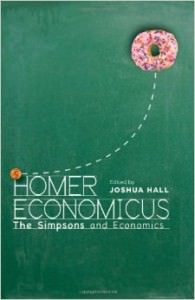
The title of Homer Economicus is a play on the economic term homo economicus, which conceptualizes the perfectly rational individual. The clever title essentially captures what the book aims to achieve – teach economic principles in an entertaining and culturally relevant way.
The book, comprised of 16 chapters and 189 pages, is effectively broken into three main sections, starting with the economic basics and moving to more advanced topics.
Part 1 – Individual behavior and decision-making
Part 2 – Money, markets, and government
Part 3 – Applied microeconomics to relevant topics including immigration and health care
To comprise the book, Hall recruited 22 contributors, most of which are professors of economics at universities such as George Mason and Baylor, allowing the reader to hear from several different voices as they unconventionally illustrate a wide range of economic topics.
The book is primarily meant to function as a teaching resource for students, but can also be a fun read for those who enjoy pop economics – and of course the Simpsons fanatics who buy anything related to the show.
Beware: Not everyone will enjoy the overflow of Simpsons references. Bloomberg Businessweek writer Peter Coy certainly didn’t. His article overflows with criticism as he encourages readers to “turn on the TV instead”. That may not be a bad idea.
The jokes get old as the book wears on, but overall it’s a noble effort at trying to make economics more appealing to people who may not find it to be. Anyone can pick up this book and not be intimidated by it, however it’s very likely that the Simpsons references outweigh the useful economic information the reader will obtain. But it could very well be sweet relief to a dull textbook.
Verdict: Read at your own risk.
And you may or may not want to check out The Psychology of the Simpsons, The Simpsons and Philosophy, The Gospel According to the Simpsons, and The Simpsons and Their Mathematical Secrets.
